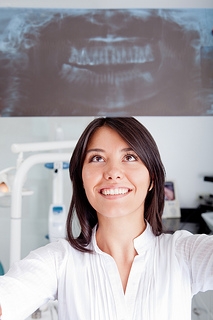How Computers Help Dental Implants Look Natural
February 8th, 2017

Never before have dental implants looked as natural and aesthetically pleasing as they do today. With the help of computer-aided design and computer aided manufacturing (CAD/CAM), Dr. Tijen Lacin, Dr. Yan Wang, Dr. Debby Hwang, Dr. Alessandra Dagostin, Dr. Ronald Lechner, Dr. Young Kim, and Dr. Neha Kuthiala and our team are able to create implants with impeccable fit and finish. Although these technologies have been in use since the 1980s, it's only recently that they became efficient and cost-effective enough to be useful.
Dr. Tijen Lacin, Dr. Yan Wang, Dr. Debby Hwang, Dr. Alessandra Dagostin, Dr. Ronald Lechner, Dr. Young Kim, and Dr. Neha Kuthiala can also take digital scans of your teeth, providing a much more in-depth and accurate representation of them when compared to traditional X-rays. This scan can be used to create a physical model of your teeth through the use of 3D printing technology, allowing for the utmost in accuracy when planning your implant treatment.
Since each of our patients are unique, these CAD/CAM technologies offer a highly customized approach to implant dentistry that helps avoid the "one-size-fits-all" ways of the past. The goal is to have an implant look and function as closely as it can to the tooth it's replacing. That’s why these implants are typically milled using ceramic or composite resin — materials chosen due to their durability and resemblance to teeth.
Even the planning of your surgery can be aided and guided by computers. 3D CT scans create a digital representation of your mouth including all significant anatomical markers. This data is imported into planning software which, coupled with CAD/CAM implant technology, is able to 3D print surgical guides that snap into place over a patient's teeth. This means less risk for surgical error and much more accurately placed dental implants.
The main benefits of CAD/CAM dental implants are that they:
- Are extremely accurate for every patient, down to 50 micrometers
- Have better long-term results and more natural-looking implants
- Can be manufactured quickly, the same day in many cases
Of course this is just a quick summary of the benefits, and a computer-modeled implant may not always be the best option. If you have questions about the dental implants or the technologies we use to make them look as natural as possible, feel free to contact our Ann Arbor, MI office.




 Website Powered by Sesame 24-7™
Website Powered by Sesame 24-7™